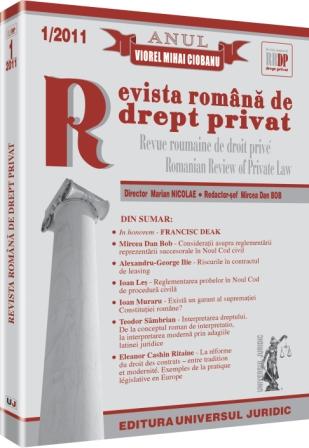Author(s): Ilie Alexandru-George / Language(s): Romanian
Issue: 01/2011
This article frames a new vision on the consequences of fortuitous destruction
of property standing for the lease agreement’s object. It is hereby attempted a reanalysis
of the legal nature of user rights and accurate identification of general
rules that would apply to risks under the lease agreement, with the view to
conclude that the special rule required provided for in Article 10 (f) of Government
Ordinance no. 51/1997 is not divergent as to these ones.
The user’s right to use is not to be assimilated to the lessor’s right, since it
fails to display the characteristics of a right to claim, but rather of a real right. The
right of option conferred upon the user is not a right to claim, either, but a
potestative right.
Distinctions are made between property risk, contract risk and duty risk. In
case of fortuitous destruction of property, the rule of law applicable is Article 971
in the Civil Code (applicable not only to property translative agreement, but also
to real rights translative agreements, provided that the actual effect of the
Agreement is automatic), or, alternatively, the general rule res perit debitori, derived
from Article 1020 in the Civil Code (in those cases in which alienation does not
automatically generate the real effect, which is still dependent on the alienator’s
act). Application of the rule res perit domino in the leasing field is defective
because, on the one hand it is a false rule in contractual matters and, on the
other hand, the agreement is not translative of ownership
If the financial corporation has submitted rights arising from the sales
agreement concluded with the supplier, he has fulfilled his essential duty, therefore
the legislature’s option so that the financial corporation retains the right of lease
installments is fair. Should a party fulfill its contractual duties, it is entitled to
consideration, even if the right transferred passed off fortuitously. This being the
case, we do not deal with a waiver to the rule of res perit debitori, the issue of contractual risks not occurring in the technical sense. The single real problem at
issue relates to the property work, which is divided among holders of rights
exercised over the property.
The risk associated with the payment of residual value is incumbent upon
the financial corporation because, contractually, it can no longer perform its duty
to sell the property (res perit debitori). On the other hand, it bears the property
risk within the boundaries of right it enjoys.
The insurance indemnity received by the financial corporation can only be
kept within the limits of its insurable interest. This insurable interest consists in
the residual value and the guarantee that compensation, as replacement of property
destroyed, confers upon the financial corporation for the payment of lease
installments. The right to a share of the insurance indemnity is conveyed as an
accessory right over the property constituted under the user’
More...



